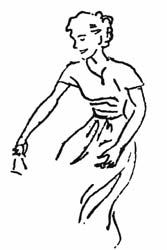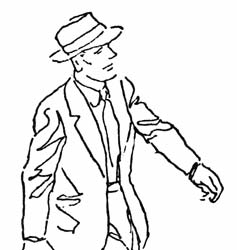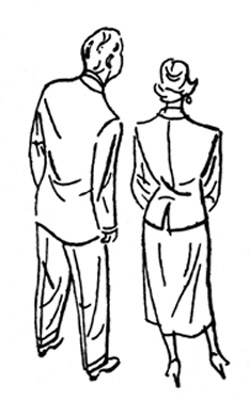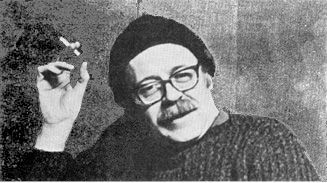Getting Rid of Mr. Grainger
Short fiction by Joseph Hansen
As originally printed in the June 1965 issue of
ONE: The Homophile Viewpoint (HIC edition)
When she came in the front door, Olive Rowe smelled cigarette smoke and she frowned. She carried the bags of groceries to the kitchen, then went down the hall to the sunny room at the back of the house. Her mother, plump and rosy, smiled at her from her wheelchair, a lavender shawl around her knees. With her sat Hale Grainger.
Her mother said, “Hello, dear, did you have a nice day?”
“Lovely, thank you,” Olive said, unsmiling.
“How was Miss Greenberg?” Her mother did not like Jews and always wrinkled her nose a little when she asked this question. It was her sole signal that she resented Olive’s friendship with Binnie.
“Miss Greenberg is fine,” Olive said. “Where’s Mrs. Murphy?”
“Well, she was anxious to leave early today, and, since Mr. Grainger so very kindly came by…”
“We let the dear old girl go,” Grainger laughed. He stood, lean, sleek, silver-haired. He bowed and smiled. It was a handsome smile. “It’s nice to see you, Miss Rowe. Your mother and I have been enjoying a little low tea. May I pour for you? It’s a blend of my own, perfected after years of trial and error — smoky Sou Chou and black with a pinch of jasmine.”
“It’s simply delicious,” Mrs. Rowe said. “I’ve never tasted such tea.”
 “Brown bread and butter?” Grainger nodded at the plate of thin slices on the table.
“Brown bread and butter?” Grainger nodded at the plate of thin slices on the table.
“No, thank you, Mr. Grainger. I’d better start supper. It’s half past five. Mother…” She couldn’t resist the dig. “You always told me you hated brown bread.”
This is different, dear. Stone ground.”
“There’s a little bakery perhaps you don’t know about,” Grainger said. “On Euclid Avenue just below Graham. Their breads are superb. I took the liberty of tucking a loaf of the brown under my arm when I came calling today.”
“And the flowers, dear — the lovely glads.”
They stood on the floor beside the French windows, a tall, silent explosion of peach color.
“Where did you find the tall vase?”
“Mr. Grainger found it. Poor man . . .” Her mother’s dimpled hand patted Grainger’s strong, tanned one. “I couldn’t tell him where it was. We so seldom use it any more.”
“I had to do a bit of ferreting, but I turned it up at the back of a kitchen cupboard. Hope I didn’t upset domestic arrangements. I tried to put things back as I found them.”
“I must put on the potatoes,” Olive said.
“And I must run.” Grainger consulted the chronometer on his wrist, a glittering device of elaborate dials, alarms and calendars. Swiss. Turning from the room, Olive wondered from whom he had stolen it.
“It’s been such a lovely afternoon she heard her mother saying.
She shut the kitchen door.
At the sink, she turned on the water hard and began to scrub potatoes. Her mother had met Grainger at a garden party at her friend Alice Whipple’s. Alice was in the real estate business. In Florida, these days, who wasn’t? Grainger was, newly. And he had been the party’s stellar attraction, with his strong, suntanned features and striking blue eyes, his vaguely English accent, his white teeth, his charm. He was sixty if he was a day, Olive thought bitterly — but then, so was Cary Grant. Those fool middle-aged women had positively drooled over him, simpering in their picture hats like insane withered flowers.
Grainger had been attentive to all, but it was Martha Rowe who won him. He had pushed her wheelchair for her along the gravel path around the little ornamental lake under the barbered willows, bending solicitously over her, smiling, chatting. And her mother had lost her heart completely. She was fifty-six years old, and she had acted like a highschool girl on her first date. Olive had been beside herself, the man was so obviously a fraud, a gigolo, a confidence man. Oh, she’d lacked the necessary heartlessness to tell her mother so. But it was high time she told Grainger.
He looked in. “Just to say goodbye.”
With a wet potato in her hand, Olive turned to him. “Could I speak to you for a minute, Mr. Grainger.”
“Why, certainly.” He was composed. He shut the door and looked at her expectantly, gravely. “Is something the matter?”
“Why do you come to see my mother so often?” She put the potato down and began scrubbing another. “Notably on the two days in the week you know I won’t be here.”
“I’m fond of your mother. She’s the most charming woman I’ve ever met.”
“Nonsense.” Olive turned sharply. “She’s as ordinary as ordinary can be. She’s a typical American widow. There are thousands just exactly like her.”
Grainger’s eyebrows rose slightly. “Why, really, Miss Rowe, I’m sure you don’t mean that.”
“It’s true,” Olive said, and was annoyed with herself because her voice shook. I love her because she’s my mother. Good Lord, I’ve devoted my life to her. But she isn’t the most charming woman you’ve ever met, and you know it. It isn’t she you’ve really come for. It’s this house, it’s the insurance, the stocks. Don’t pretend you don’t know my father left her well-fixed. I know your type. You’ve looked into it.” She turned again to the sink. “It’s certainly not her charm.”
 But Grainger wasn’t shaken. His voice came calm and deceptively without reproach. “It is. And her helplessness. She’s not only a pretty thing, Miss Rowe, she’s — very feminine.” He let that sink in. It was true as Olive well knew that her mother was very much what the cliché “clinging vine” meant. And, she reflected grimly, it was also true that Olive Rowe, herself, did not walk but strode, her voice was gruff and mannish, her body angular ‘ not soft; clumsy, not graceful. She tried, in the ordinary run of things, not to be paranoid about it. But Grainger, she felt sure, meant it as a dig. “Very feminine,” he went on, “and appealing. I like your mother very much. In fact… I love her.”
But Grainger wasn’t shaken. His voice came calm and deceptively without reproach. “It is. And her helplessness. She’s not only a pretty thing, Miss Rowe, she’s — very feminine.” He let that sink in. It was true as Olive well knew that her mother was very much what the cliché “clinging vine” meant. And, she reflected grimly, it was also true that Olive Rowe, herself, did not walk but strode, her voice was gruff and mannish, her body angular ‘ not soft; clumsy, not graceful. She tried, in the ordinary run of things, not to be paranoid about it. But Grainger, she felt sure, meant it as a dig. “Very feminine,” he went on, “and appealing. I like your mother very much. In fact… I love her.”
“And how many women have you said that about, and to, in your lifetime, Mr. Grainger?”
She plunked down the last of the potatoes and walked to the refrigerator for butter. “On how many continents?”
“I had a wife, Miss Rowe,” he said quietly. “For twenty-eight years. She was a dear, soft, sweet little thing like your mother … gentle, and not terribly bright. But I loved her. Your mother is the first woman I have said this about (you needn’t be alarmed: I haven’t said it to her, yet) since Bernice died.”
Olive rubbed the potatoes, with butter, one by one. “If that’s true, then I’m sorry. But I don’t want you coming to visit my mother any more, Mr. Grainger.”
“Don’t you think that decision ought to be hers?”
“No,” Olive flared, “I don’t. She’s smitten with you. And I am not. I’ve had to do a lot of judging about what was good for mother and what wasn’t, over the years. All of the judging, in fact. I’m used to it. And I’m good at it, what’s more.”
She thrust out her chin, blinked angrily at him, and bent to open the oven door. She laid the potatoes on the rack and let the door slam to on its spring.
“I’m not talking out of prejudice, Mr. Grainger. I too have made inquiries. You drive a fine automobile, a new Lincoln…unpaid for. You live expensively at the Mirador but your bank balance (I have a friend who works at the bank, Mr. Grainger) is less than a thousand dollars. You are a real estate salesman, but in your first three months at Allied Florida Land, you haven’t made a single commission. You’re after my mother for her money, Mr. Grainger. That’s what the facts tell me.”
She stood trembling before him, defiant, sure of herself. He forced a smile and gave a little shrug. “Facts can mislead us sometimes, Miss Rowe. And there are other things besides money…” His laugh was soundless. “But then, you’ve heard that one.”
“And always from those who don’t have it and want to get it the easy way,” Olive said.
Grainger gave a stiff, humorous little bow. “Goodbye, Miss Rowe. While you’re mistaken, your candor and your…” His smile was wry. “…your guts, do you credit. They would (and I expect this is the highest form of flattery I could give you) they would do credit to a man. Goodbye.” And he was out the door.
Goodbye and good riddance, thought Olive Rowe.
She stared at Binnie Greenberg, slim and big-eyed, in blue denims and an orange linen blouse. Binnie’s studio was a white loft with a low ceiling on the roof of a building in downtown Jacksonville. The furniture was Japanese. There was a vast drawing table in a white blaze of fluorescent light, racks of drawing papers, shelves of type specimen books, t-squares, triangles, French curves, jars of brushes and pens. On the wall hung a big green and white Matisse. Binnie sat on the tall stool with her back to the drawing board and grinned ecstatically. She bent toward Olive and clapped her slender hands between her knees in a paroxysm of joyous excitement. Her black eyes shone.
“I’ve got it, I’ve got it, I’ve got it, Ollie!”
Olive’s heart sank. She didn’t take her eyes from Binnie’s radiant face, but she reached for a chair back to steady herself. Inside, silently, she was saying over and over again, no, no…no, no. She made herself smile. “You mean…the job? The One you said…”
“Look. Read it and rejoice. Isn’t it too much?” Binnie jumped from the stool like a ten year old, flagged a letter from the desk and thrust it into Olive’s hands. While Olive read the words on the stiff, elegant paper, Binnie alternately stroked her back and hugged her waist. Then, when Olive raised her gaze from the typing, Binnie tossed the letter away, pulled Olive tight against her and kissed her hard and long.
“Oh, Ollie, Ollie! It’s come at last. What I’ve waited all my life for. Jesus. Imagine. All around the country, all around the world, there are artists working and waiting for this. It’s one of the big prizes, Ollie. The biggest.”
“Yes, dear, yes,” Olive said softly into the dark perfume of her hair. She held the younger woman’s quivering excitement close and desperately. “It’s wonderful. But I knew it would happen.”
Oh, that was false. She hadn’t known. Loving Binnie as she did, she still hadn’t believed. She knew Binnie was a gifted designer. But she’d never been able to think (or had she only never allowed herself to think?) that this was any more than a daydream — that she would become art director of one of the two or three biggest advertising agencies in New York. At twenty-eight? A woman? Impossible.
“I knew it would happen,” she said again, “because I know how wonderful you are. Nobody knows that better than I do. Do they, Binniekins? Do they?”
“No, sweet, no…”
They lay in shadow, the faint rosy glow from the city’s neons coloring the broad, bamboo-blinded windows above them, the sound of the night traffic a muffled distant hum. They lay together in grateful nakedness, smoothness to smoothness, contentedly spent. For a time they smoked, and Binnie chattered on once more about the job and all it would mean until, like a child after a big birthday party, she was suddenly asleep.
But Olive could not sleep. Foolishly, fondly, again and again, she had promised that when the chance came to Binnie she would, without nonsense, knowing what she prized and what must be foresworn, pick up the telephone, call a nursing service and get a white and starchy and efficient woman to the house for good and all, pack up her own things, say to her mother, Goodbye, mother darling, and shut the door and ride in a taxi to the airport and be off with Binnie to New York. So she had foolishly, fondly, again and again promised…when it was out of the question that she would ever have to keep that promise as it was that Binnie would ever get the great, fabulous, the unimaginable job.
Yet now the moment had come to keep the promise and she knew she must keep it, because Binnie was the sweet, warm, quick, perfect answer to her deepest hungers, and if she did not follow Binnie, she would die — not in the melodramatic sense, but only in the dull sense that had nothing to do with ropes, knives, pistols, sleeping pills. Dying inside oneself.
If only the letter had not come. If only they could have gone on together as they had been, Mrs. Murphy coming in to look after her mother on Thursdays and on Saturday afternoons and evenings, and for an occasional week to let Olive trek with Binnie to New York to see the shows — Mrs. Murphy, who was distinctly not a nurse, but with her slovenly Irish mother-hen kindliness the only woman her mother would tolerate to look after her. Her mother couldn’t stand nurses. They make me feel I’m sick and dying. I’m not sick, Olive, I’m only paralyzed. I won’t be treated like I have a loathsome disease.
God help me, Olive thought, it’s going to be so damn difficult. Have I got the courage? Who was it had said to her not long ago that she had guts? Grainger. She laughed.
“Mmm?” Sleepily Binnie stirred and kissed her shoulder.“What’s to laugh?”
“The answer to a maiden’s prayer, chuckled Olive.
“Miss Rowe, This is a surprise.”
He met her in his hotel room, that was spacious and smart and hushed, save for a thread of muzak in the cool, conditioned air. He was elegant even in his shirt sleeves. Beautiful leather grips lay open on the bed. One was full of neatly packed clothing, the other partially full. He laid an expensive Scots wool sweater on the bedspread and carefully folded its sleeves.
“I confess,” he went on, “I was startled when the clerk told me it was you.
“I don’t blame you. I was terribly rude last week, Mr. Grainger. I want to apologize.”
“Well-timed,” he said. “Another hour and I’d not have been here. But there was really no need, Miss Rowe. I benefited by your words, however harsh.” He flashed her a smile. “Excuse me. Won’t you sit down? Cigarette?”
 “Thank you.” They were Players, in a slim, ostrich-hide case. She took one and he lit it for her. “You know,” she said, “you mustn’t think of going. Not on account of me. That would be dreadful, I’d feel terrible. I was too hasty. You were right. I’m overprotective of my mother, foolishly suspicious. I’m afraid we old maids…” Ah, she was calculating now. “We old maids, we unlit lamps, are sometimes like that. Jealous of our charges, afraid to let them have other human contacts. Actually, you were very good for my mother. She looked better than she had in years, during the weeks you came to see her.”
“Thank you.” They were Players, in a slim, ostrich-hide case. She took one and he lit it for her. “You know,” she said, “you mustn’t think of going. Not on account of me. That would be dreadful, I’d feel terrible. I was too hasty. You were right. I’m overprotective of my mother, foolishly suspicious. I’m afraid we old maids…” Ah, she was calculating now. “We old maids, we unlit lamps, are sometimes like that. Jealous of our charges, afraid to let them have other human contacts. Actually, you were very good for my mother. She looked better than she had in years, during the weeks you came to see her.”
“Did she?” He went on with his packing.
“Yes, she did. And I want to say that I wish you’d come back. I wish you’d just forget what I said.” She ground out the cigarette in the ashtray and rose to walk to where she could face him. “Come back, Mr. Grainger. She needs you. I was selfish and unfair…”
“I’m leaving for Europe, Miss Rowe,” he said. “I have not done well in Florida real estate. I’m afraid…” He gave a rueful grin. “I’m completely broke, so far as America goes. But there is some money in a London bank, and a little more in a Swiss bank. And living is cheaper there.”
“Oh, but,” Olive said, “you mustn’t go. My mother can help you get started here. She has many contacts. And even if she couldn’t…” Olive reached out to him, begging now, utterly unsubtle “…she needs you, Mr. Grainger.”
“I’m afraid too many people would think as you think about me, Miss Rowe,” he said, “if I were to marry your mother. And that’s what it would come to. I’m afraid there wouldn’t be much happiness for her. Her friends would change. She would be miserable. I’m happy for her sake that you made me reconsider. Not how it was…” His smile was gently reproving. “Your facts were right, but your inferences were wrong. I love your mother and did not want her for her house or her income. I wanted her only because I loved her. But perhaps you don’t know about love? — That’s cruel. I’m sorry.”
“It’s not cruel,” Olive said. “It would be if I didn’t, but it so happens I do.”
“Good. Then I think you believe me now.”
He was wrong. She would never believe him. But that didn’t matter. Olive Rowe and Binnie Greenberg were what mattered now.
“I care too much for your mother to burden her with the ugliness that would follow if I were to marry her. I’m over sixty-five, you know, Miss Rowe. She wouldn’t have me except long enough to come to depend on me, and then I’d be dead. And she’d be without husband as well as without the friends said husband had lost her. No, you were right. You are wise beyond your years…”
He closed and strapped the suitcases and set them on the floor. It took him several minutes, but when he looked at her again, Olive had not changed her position nor her expression either. She wasn’t able to take her eyes off him.
“Ah, Miss Rowe,” he smiled uneasily, “do you know about the basilisk? I seem to have done the wrong thing again. Am I not, even now, at our final meeting, to escape displeasing you?”
“What? Oh, Mr. Grainger. I’m sorry.”
And she was sorry. Very.
 A Tangent Group Exclusive
A Tangent Group Exclusive
This page was sponsored by C. Todd White and Robert R. Cook in honor of Joseph Hansen’s 80th birthday.
©1965, 2016 by The Tangent Group. All rights reserved.


